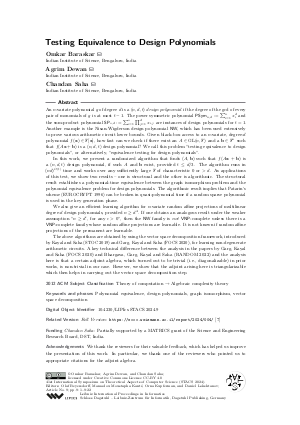@InProceedings{baraskar_et_al:LIPIcs.STACS.2024.9,
author = {Baraskar, Omkar and Dewan, Agrim and Saha, Chandan},
title = {{Testing Equivalence to Design Polynomials}},
booktitle = {41st International Symposium on Theoretical Aspects of Computer Science (STACS 2024)},
pages = {9:1--9:22},
series = {Leibniz International Proceedings in Informatics (LIPIcs)},
ISBN = {978-3-95977-311-9},
ISSN = {1868-8969},
year = {2024},
volume = {289},
editor = {Beyersdorff, Olaf and Kant\'{e}, Mamadou Moustapha and Kupferman, Orna and Lokshtanov, Daniel},
publisher = {Schloss Dagstuhl -- Leibniz-Zentrum f{\"u}r Informatik},
address = {Dagstuhl, Germany},
URL = {https://drops.dagstuhl.de/entities/document/10.4230/LIPIcs.STACS.2024.9},
URN = {urn:nbn:de:0030-drops-197193},
doi = {10.4230/LIPIcs.STACS.2024.9},
annote = {Keywords: Polynomial equivalence, design polynomials, graph isomorphism, vector space decomposition}
}

 Creative Commons Attribution 4.0 International license
Creative Commons Attribution 4.0 International license


